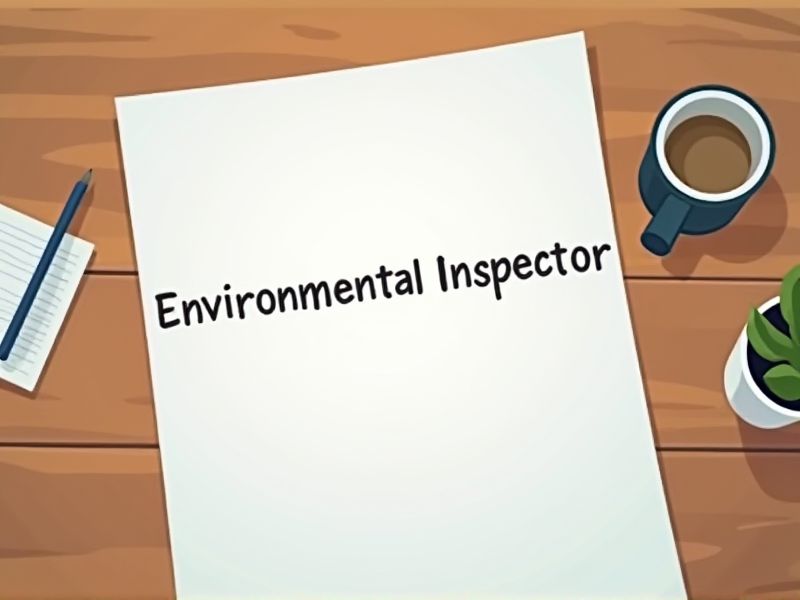
Environmental Inspectors are responsible for ensuring that industries and businesses adhere to environmental laws and regulations. Obtaining certain certifications equips them with the necessary skills to assess, report, and manage environmental hazards effectively. Certifications often verify an inspector's knowledge in areas such as pollution control, hazardous waste management, and environmental impact assessment. Here are some essential certifications you may need as an Environmental Inspector.
Certified Environmental Inspector (CEI)
A Certified Environmental Inspector (CEI) ensures compliance with environmental regulations, reducing legal risks for organizations. This certification provides inspectors with comprehensive knowledge of environmental laws and best practices. CEI credentials enhance credibility, fostering trust with stakeholders and clients. Proper environmental inspections can lead to early detection of potential environmental hazards, averting costly damage.
Certified Environmental Professional (CEP)
Regulations and standards in environmental sectors continuously evolve, requiring an Environmental Inspector to have updated knowledge and skills, which a Certified Environmental Professional (CEP) can provide. Task complexities in assessing environmental impact demand a high level of expertise; CEP certification ensures inspectors are well-equipped to handle such intricacies. Legal compliance necessitates that inspections be conducted thoroughly to avoid violations, and a CEP-certified inspector brings credibility and assurance of professional competency. The need for advanced problem-solving during environmental assessments is met by the specialized training and methodologies that a CEP qualification entails.
Certified Hazardous Materials Manager (CHMM)
Environmental Inspectors oversee compliance with regulations, and a Certified Hazardous Materials Manager (CHMM) enhances this role by providing specialized knowledge in hazardous materials management. The CHMM certification ensures that inspectors have the expertise to identify and mitigate risks associated with dangerous substances. Proper handling and disposal of hazardous materials prevent potential regulatory infractions and environmental contamination. The CHMM designation aids inspectors in advising organizations on best practices for safety and environmental compliance.
LEED Accredited Professional (LEED AP)
Environmental Inspectors benefit from being LEED Accredited Professionals (LEED AP) due to the increased understanding of sustainable building standards. This accreditation provides them with the expertise to evaluate projects for environmental compliance and sustainability goals effectively. The LEED AP credential equips inspectors with the skills to recommend energy-efficient solutions that can lead to significant cost savings and reduced environmental impact. Holding a LEED AP designation often enhances an inspector's credibility and career opportunities within green building initiatives.
NEBOSH Environmental Management Certification
The NEBOSH Environmental Management Certification equips Environmental Inspectors with the knowledge required to identify environmental risks and implement effective mitigation strategies. Understanding legal and regulatory frameworks becomes easier, aiding in compliance with environmental laws. The certification enhances an inspector's ability to conduct audits and assessments, ensuring organizations minimize their ecological footprint. Employers often seek certified personnel, which increases demand for inspectors with this credential.
OSHA HAZWOPER Certification
Environmental Inspectors often face hazardous conditions, which makes OSHA HAZWOPER Certification essential for ensuring safety. This certification provides the necessary training to recognize and properly handle dangerous materials. Without this training, inspectors risk exposure to toxic substances, which can lead to severe health consequences. Employers also benefit as the certification helps minimize legal liabilities and ensures compliance with federal safety regulations.
OSHA 30-Hour Safety Certification
Obtaining an OSHA 30-Hour Safety Certification equips an Environmental Inspector with essential knowledge of occupational safety and health standards. This certification enhances the ability to identify and mitigate potential hazards in various environmental settings, contributing to safer inspection processes. Regulatory compliance often necessitates such certifications, ensuring that inspectors adhere to federal and industry-specific safety requirements. Improved safety awareness from this certification can lead to reduced incidents and enhanced protection for both the inspector and the environment they monitor.
Certified Industrial Hygienist (CIH)
Environmental inspectors focus on identifying and mitigating health hazards in various workplaces, which necessitates specialized knowledge; a Certified Industrial Hygienist (CIH) possesses expertise in anticipating, recognizing, evaluating, and controlling environmental and occupational hazards. The rigorous certification process ensures CIHs stay up-to-date with standards and regulations required for comprehensive hazard assessments. Their skills are crucial for designing effective control strategies to protect worker health and safety, ensuring compliance and minimizing liability. The presence of a CIH adds credibility and technical acumen to environmental inspections, reinforcing sound decision-making and regulatory adherence.
Certified Safety Professional (CSP)
Environmental inspectors face complex regulatory landscapes, and a Certified Safety Professional (CSP) credential ensures they possess the necessary expertise to navigate these challenges effectively. This certification equips professionals with advanced safety protocols, reducing incidents and enhancing compliance. A CSP demonstrates a commitment to continuous learning and adherence to high industry standards, fostering trust among stakeholders. Companies often prefer or require CSP-certified individuals to mitigate risks and align with best practices in environmental safety.
Certified Environmental Auditor (CEA)
Certified Environmental Auditors (CEA) bolster credibility and ensure adherence to stringent environmental regulations during inspections. Their expertise can identify potential risks and non-compliance issues that untrained inspectors might overlook. CEAs have specialized skills that enable them to more effectively evaluate environmental impact and suggest improvements. The CEA designation often equips inspectors with updated knowledge about environmental standards, fostering more efficient and accurate assessments.
Summary
With certifications, you will enhance your credibility as an Environmental Inspector. This increased trust can lead to more job opportunities and higher earning potential. Acquiring certifications often results in improved skills and knowledge, equipping you to handle complex environmental issues. Organizations benefit from certified inspectors, which might improve overall environmental compliance and regulation adherence.
